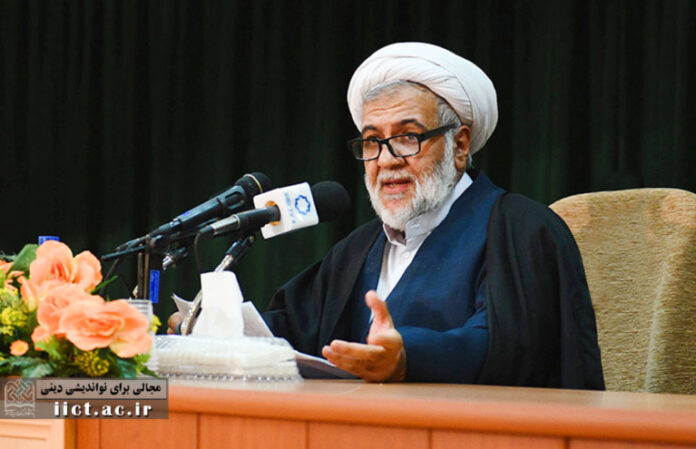The Philosophy of the Absence of Ali’s (AS) Name in the Quran
An Essay by Hujjat al Islam Wal-Muslimin Mohammad Hasan Qadrdan Qaramaleki, Faculty Member of the Islamic Theology Group at the Institute
Numerous verses in the Holy Quran pertain to the Imamate of Imam Ali (AS), explained and elaborated upon in various sources. Anyone who looks at these verses impartially will discern his divine Imamate. However, the question of why his name is not explicitly mentioned in the verses has been raised since the era of the Infallible Imams, such as Imam Baqir (AS). In response to this question, the following points are noteworthy:
- Lack of Necessity, Given Specific Verses About Ali (AS):
In some verses, attributes such as Imamate, Guardianship, Purity, and Infallibility are generally attributed to some companions, which, in reality, refer exclusively to Imam Ali (AS). For instance, the verse of Guardianship “Your Guardian is only Allah” revealed regarding him giving alms while in the act of bowing. Some verses directly introduce Imam Ali (AS) as the Imam, Guardian, Leader, Guide, and a member of the Ahl al-Bayt with clear indications acknowledged by all or most companions. Therefore, there was no misunderstanding in applying these verses to Imam Ali (AS), negating the need to explicitly mention his name.
For example, if a father, on his deathbed, bequeaths that his heir must be someone who has memorized the entire Quran or is a doctor, and only one son named X meets this criterion, specifying the son’s name is unnecessary. The father is not legally obliged to name the heir explicitly, given the clarity of the conditions. Similarly, regarding Imam Ali’s (AS) succession and Imamate, the situation is even more pronounced.
- Possibility of Doubt in Attributes Attributed to Him:
Even if Imam Ali’s name had been mentioned in the Quran with attributes like Imam, Guardian, and Caliph, doubts could arise concerning the interpretation of these titles. In other words, the doubt about not mentioning Ali’s name in the Quran could shift to another doubt about the ambiguity of the attributes associated with him. This argument can be supported by pointing out doubts raised in prophetic traditions where Imam Ali’s name, along with titles like Imam, Caliph, and Guardian, is clearly mentioned, yet opponents have questioned their meanings rather than his identity.
- Mention of Ali’s Name in Prophetic Traditions:
It has been noted that Imam Ali’s name is explicitly emphasized in the Prophet’s traditions as the Imam, Caliph, etc. The Prophet’s words, as stated in the Quran, are considered divine revelation: “Nor does he speak from [his own] inclination. It is not but a revelation revealed” (chapter An-Najm: 3-4). The Prophet himself is also introduced as the interpreter and clarifier of the Quran: “We have sent down to you the message that you may make clear to the people what was sent down to them” (chapter An-Nahl:44). This answer is reflected in a narration from Imam Baqir (AS). Nonetheless, opponents have cast doubt on the implication of these traditions regarding Imam Ali’s Imamate and have sought to reinterpret and deny various prophetic texts.
If someone claims, “I do not accept the Prophet (SA), and Ali’s name should have been mentioned in the Quran,” one must note that someone who does not accept the Prophet, the bringer of the Quran, cannot understand its divine origin. Moreover, such a person cannot be considered a Muslim, and fortunately, we have not encountered such individuals.
- Prevention of Quranic Alteration:
Some individuals focused all their efforts on seizing power and caliphate after the Prophet’s demise, resorting to any means, including altering the Quran. To protect the final divine book, God sufficed with mentioning Imam Ali’s (AS) exclusive attributes and prophetic traditions instead of his name in the Quran.
This approach ensured both the introduction and appointment of Imam Ali (AS) to the caliphate and the prevention of Quranic alteration.
- Preventing political and security damage
Another point is that God intentionally refrained from mentioning Imam Ali’s name explicitly as a successor, not to test true believers but because He knew, through His eternal knowledge, that political and governmental affairs often lead to disputes, rivalries, and possibly bloody internal wars. If the Quran had explicitly named Imam Ali (AS) as the successor, supporters and opponents would have fought each other, jeopardizing the fledgling Islamic state.
For example, religious extremists from both Sunni and Shia sects have accused each other of apostasy and even engaged in violence, resulting in the deaths of many, as recorded in history. If such explicit mention existed in the Quran, disputes, conflicts, killings, and excommunications would have surged, posing a significant threat to Islam and Muslims, counteracting the purpose of Imamate, which is to strengthen Islam and leadership.
- Consideration of Muslim Welfare and Prosperity:
If Imam Ali’s name had been mentioned in the Quran alongside other religious tenets like Prophethood, Resurrection, or legal rulings like prayer and fasting, rejecting or doubting these would be equivalent to apostasy, which contradicts divine wisdom and mercy.
Shia scholars, who consider Imamate as a secondary tenet (not a fundamental principle of religion), view it from this perspective, believing that Sunni brothers, by denying Imam Ali’s Imamate, have exited Shia doctrine but not Islam. Had Imam Ali’s name been explicitly mentioned in the Quran as the immediate successor, there would be no room for this interpretation, and denying his Imamate would equate to apostasy.
Thus, out of mercy and goodwill for Muslims, God did not explicitly mention Imam Ali’s name in the Quran.




